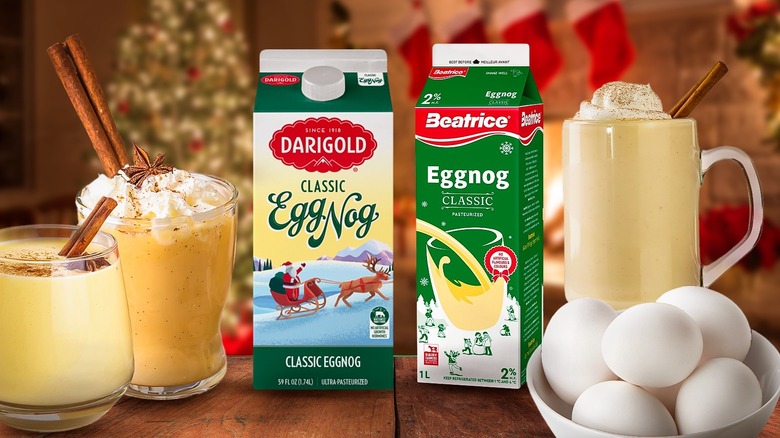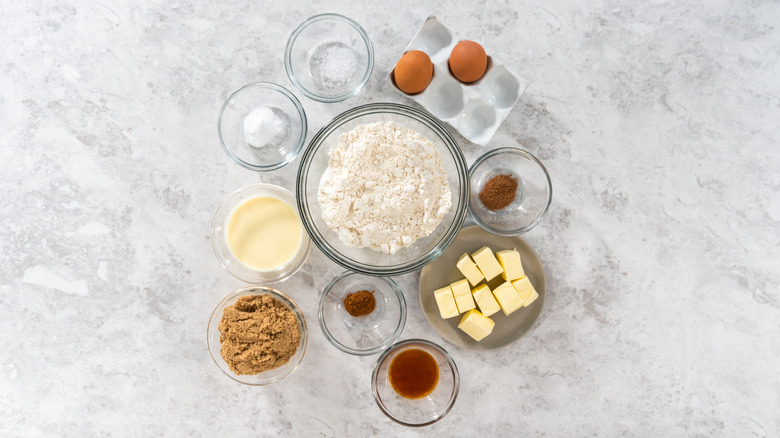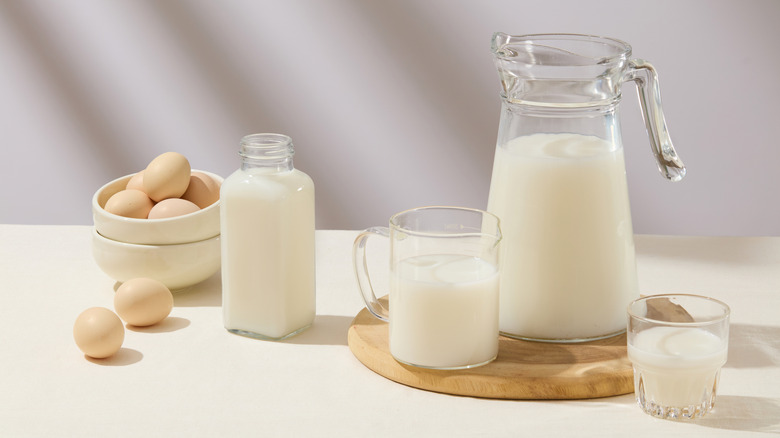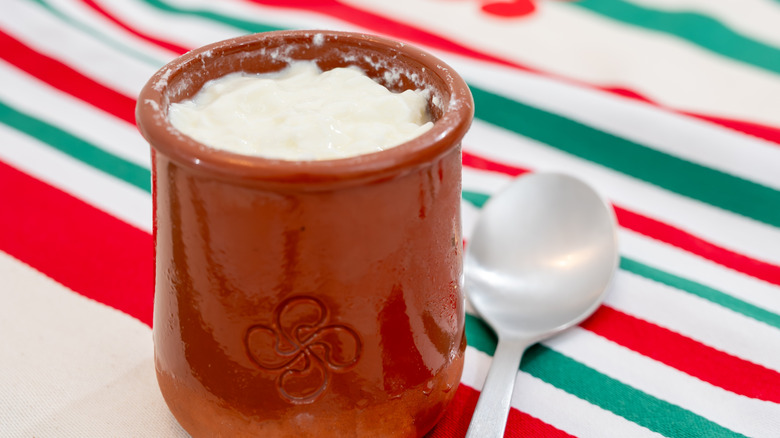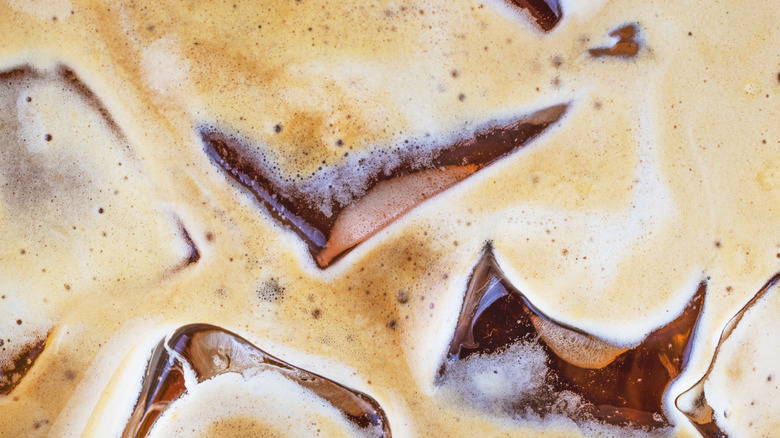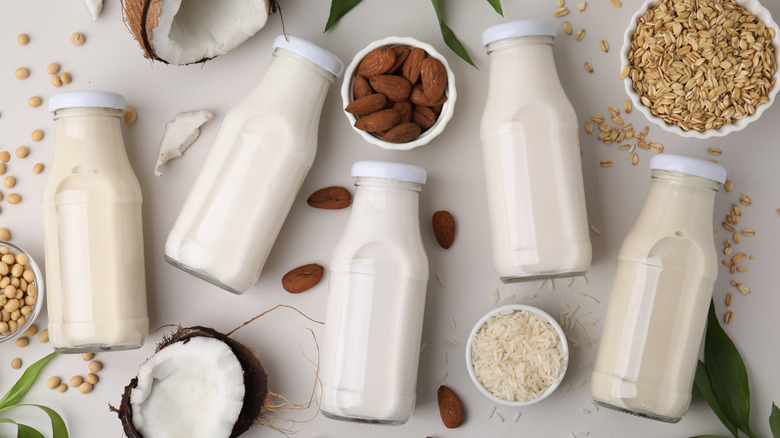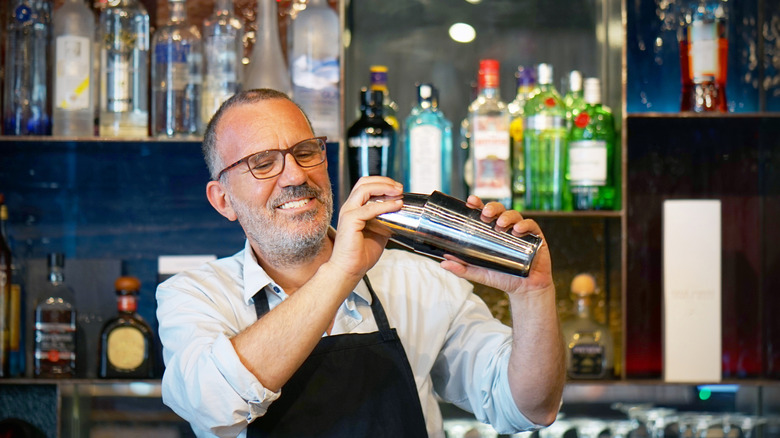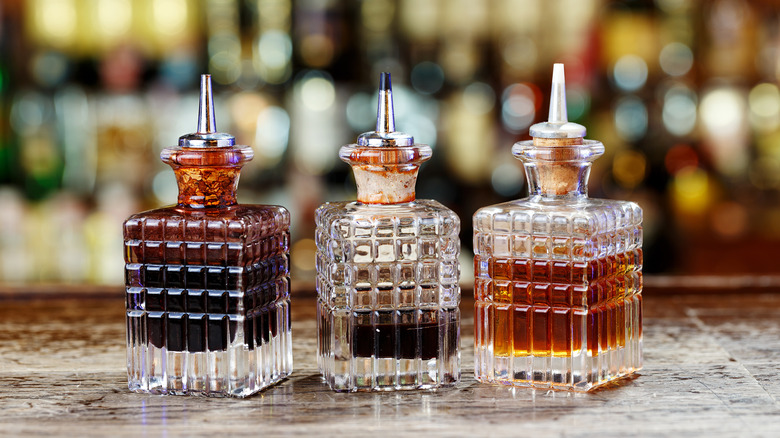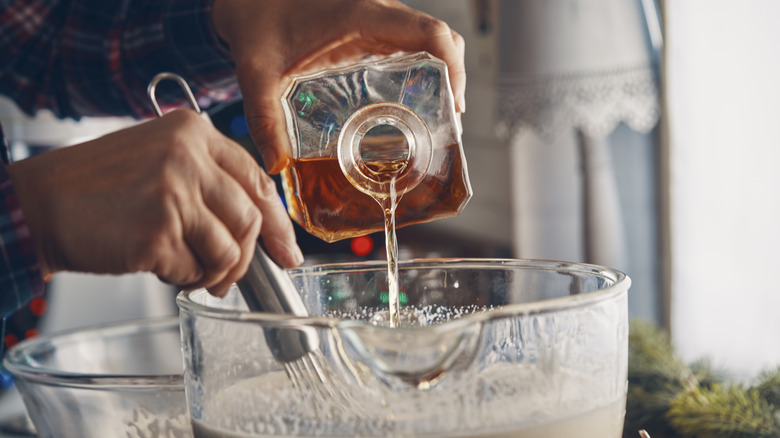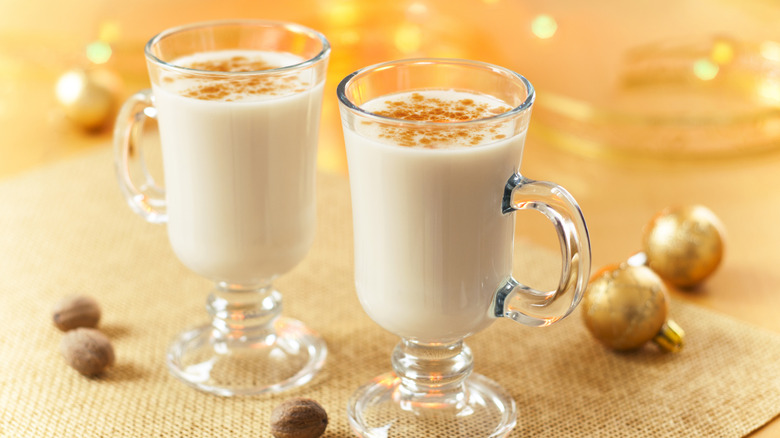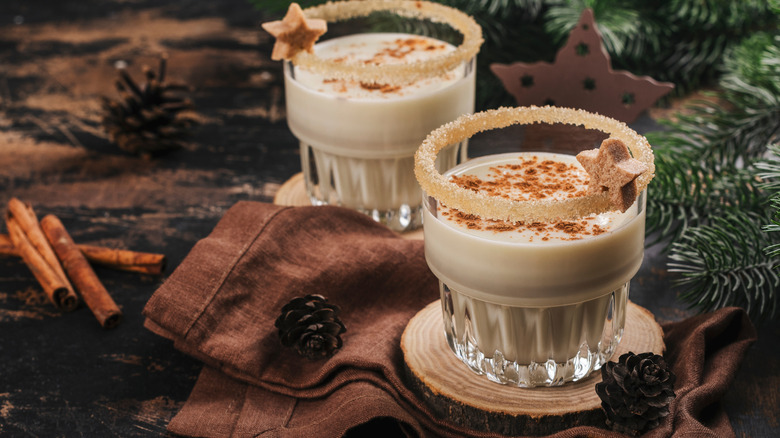13 Pro Tips To Elevate Your Eggnog Cocktails For The Holidays
We may receive a commission on purchases made from links.
With the holiday season fast approaching, it's time to start thinking about how to wow your friends and family with scrumptious food and delicious drinks. It's hard to go wrong with rich and creamy eggnog, but if you really want to impress, it's worth elevating the classic winter tipple by mixing up some holiday cocktails.
Eggnog can make for an excellent cocktail base when used correctly. However, despite being a fairly versatile ingredient, there are some things worth knowing about eggnog cocktails before you dive in. The experience I've picked up over an extensive career as an international cocktail bartender has shown me that not every recipe works out, even if it sounds like a great idea. This is especially true with eggnog, a drink that usually contains eggs and dairy. Whether you opt for the store-bought variety or fancy whipping up a batch of eggnog at home, it's worth being aware of the potential mixology pitfalls.
So, to save you from wasting ingredients or serving up an unpalatable mixture, I want to highlight some important tips to bear in mind if you want to include eggnog in your cocktails.
1. Keep flavor balance in mind when choosing cocktail ingredients
The most fundamental lesson you learn as a cocktail bartender is that balance is key. Regardless of the ingredients you use and the drink's dominant flavors, if they don't harmonize with one another, the cocktail won't work.
When using eggnog as a cocktail base, it's important to remember that you're working with an ingredient that's incredibly rich, creamy, and relatively sweet. Therefore, your other additions are going to need some bite to balance out the eggnog. It's fine if your recipe includes some sweet ingredients too, but you've got to be careful not to overdo it.
In terms of your main spirit, I always suggest opting for a dark, aged liquor. Rum is a classic pairing for eggnog because it has a touch of sweetness, but it's usually robust enough to stand up against the cream. Although their core flavors differ, bourbon and brandy are also great picks for the same reason. White spirits like vodka, gin, or tequila can work, but I've found they're less forgiving if you get your ratios wrong. If you decide to go that route, you'll want to spend some time testing your recipe to perfect it. Liqueurs can also work for introducing luxurious flavors like chocolate, orange, or vanilla, but you should try to avoid overly sweet brands or use them in moderation where possible.
2. Go easy on the alcohol
If you've ever had the pleasure of drinking booze-infused eggnog, you'll know that it can be a little dangerous. The rich profile of eggnog means it can quite easily mask the strength of the alcohol. I know that's kind of the whole point, but you should still approach your eggnog cocktail recipe with caution.
My main bit of advice for making eggnog cocktails is to always make sure your alcoholic ingredients elevate the flavor first and foremost. Just because you can add more booze without it being too noticeable doesn't mean you should. You can quite easily run the risk of overserving. I'd much rather have my guests able to come back for a second helping and have an enjoyable evening without my cocktails sneaking up on them and ruining their night (and possibly their morning). This is where liqueurs come in. Although a tasty spirit makes a great base for an eggnog cocktail, look to lower alcohol-by-volume (ABV) liqueurs to enhance the taste and provide a bit of a kick without making your drink too strong. It's also worth being aware that some popular liqueurs, like Cointreau and Grand Marnier, can be just as strong as whiskey and rum, so always check the label.
3. Some cocktail ingredients aren't suitable for hot cocktails
From hot buttered rum to Irish coffee, I'm a huge fan of warm cocktails when the temperature drops. Although people usually drink it cold these days, eggnog tastes equally delicious when served warm. In fact, historically, eggnog-style beverages were heated up to keep the drinker nice and toasty during the winter months.
Although heating eggnog will subdue the drink's sweeter flavors, it's a great way to highlight its spicier notes. However, while unadulterated eggnog can be warmed up without any issues, that might not be the case when you try heating an eggnog cocktail that has additional ingredients. For example, spirits with vegetal, earthy, and botanical profiles — like gin or blanco tequila — can taste astringent or medicinal when heated. Vodka is another liquor to avoid, as the heat tends to emphasize the neutral spirit's ethanol flavors without bringing anything else to the table. For warm eggnog cocktails, you're safer sticking with aged spirits like whiskey or rum. The flavors they pick up from maturing inside an oak barrel, such as vanilla, caramel, baking spices, and oak, are much better suited for hot cocktails.
4. Use lighter dairy to avoid making your cocktail too rich
One of the things that makes eggnog so enjoyable is its decadent texture, which is created by the thick, velvety blend of egg and full-fat milk or cream. However, when you're using eggnog in a cocktail, there's a risk of making your drink too rich.
If you're only mixing a base spirit into your eggnog, you should be fine. The issue is more common when you start including other rich ingredients, like creamy liqueurs. Fortunately, there's a super simple solution. If you're whipping up some eggnog specifically for cocktails, try swapping out the heavier dairy component for a lighter one. For example, half-and-half or low-fat milk will result in a thinner concoction that's more suitable for mixing. The eggnog will still thicken up nicely if you're shaking your cocktail, but the flavors won't be thrown out of balance. You can also try alternative milks, like almond, oat, or coconut milk. These are typically less heavy than regular milk. While you may need to tweak your recipe to compensate for the difference in flavor, those alternatives don't normally don't taste intense enough to overwhelm your other ingredients.
5. Avoid acidic ingredients to prevent your cocktail from curdling
Although eggnog is a fairly versatile cocktail base, you should do your best to avoid combining it with any acidic components, such as citrus juice. The resulting concoction is rarely appealing.
The problem is that although milk is already slightly acidic, if its pH level drops too much, the milk proteins start clumping together. We call this curdling. Although this process isn't harmful — we use it to make cheese, after all — it's not something you want in a cocktail. There is technically a way to combine milk and citrus juice in a cocktail, but it's pretty labor intensive. The Ramos Gin Fizz is a well-known drink that manages it, but it involves shaking the ingredients extremely hard for an extended period of time to emulsify everything. Henry Ramos, who invented the cocktail in 1888, claimed the drink needed to be shaken for a total of 12 minutes. Legend has it that he once employed up to 35 bartenders whose job was to shake the cocktail in shifts. Most modern bartenders agree that was probably overkill, but if you plan on making a bunch of cocktails, you're better off just avoiding acidic ingredients altogether.
6. You may need to dilute your eggnog cocktail
There's one ingredient that features in almost every single cocktail that most people don't consider: water. Although we stir or shake cocktails with ice to chill them, the process also introduces water to the recipe. Without water, the drink can taste unpleasantly strong.
In some cases, the eggnog itself will help dilute your cocktail, so adding extra water may be unnecessary. However, if you don't plan on shaking or stirring your eggnog cocktail with ice, there's a chance it'll taste too heavy or boozy. You're more likely to encounter this issue if you're making warm eggnog cocktails, especially as alcohol usually has a more pronounced ethanol flavor when it's warm. Fortunately, the solution is as simple as incrementally adding water until the flavors fall into balance. You could even try adding fresh coffee to a warm eggnog cocktail for a bitter kick that balances the drink's sweeter flavors and reduces the alcohol heat. Tea is another superb option. There are plenty of interesting varieties to choose from, depending on whether you want to add a fruity, herbal, earthy, or even smoky dimension to your cocktail.
7. Use pasteurized eggs to avoid the risk of food-borne illnesses
This particular bit of advice applies even if you're making eggnog without the intent of using it for cocktails. However, I feel it's important enough to mention anyway, as it relates to a fairly serious health risk.
Most eggnog recipes include raw eggs. Some suggest using only egg whites, some recommend yolks only, and others call for both. Unfortunately, raw eggs are one of the most common sources of salmonella, a bacteria that can lead to severe illness with symptoms akin to stomach flu. Not everyone experiences symptoms from salmonella infection, but it can be highly unpleasant for those who do. On rare occasions, it can also be life-threatening. The good news is that there's an incredibly simple way to make raw eggs safe -– pasteurization. Pasteurization is a process that involves heat-treating food to neutralize microorganisms, such as harmful bacteria, and extend its shelf life. The U.S. Department of Agriculture states that pasteurized in-shell eggs are safe to consume raw. So, when you're making any dish or cocktail that calls for raw eggs, make sure you opt for the pasteurized variety.
8. Delight vegan friends and family with a plant-based eggnog
With plant-based diets becoming more and more popular, it's always worth knowing how to tweak your recipes to cater to those who can't consume animal products. Even if you don't have vegan guests, some people have dairy or egg allergies that make classic eggnog recipes unsuitable. The good news is that you can quite easily substitute ingredients without sacrificing quality, meaning everyone can enjoy your eggnog cocktails.
For the dairy element of your eggnog, coconut milk is ideal. If you want to thicken your mixture, you can even add some coconut cream to boost the texture. Although your cocktail will have a slightly coconutty taste, your other ingredients will typically mask it. To replicate the frothiness from egg whites, you can use chickpea brine, also known as aquafaba, in your cocktails. It'll foam up in the same way when you shake it, and it has a neutral flavor. In terms of measurements, you can swap one egg white for 1 ounce of aquafaba. To emulate the rich characteristics of egg yolks, you can blend cashew nuts and add them to your eggnog. Just make sure you soak your cashews first to avoid making your drink taste grainy. Lastly, if you're not sure whether an alcoholic ingredient is vegan-friendly, I recommend using a resource like Barnivore to be on the safe side.
9. Shake twice for an airy mouthfeel
One of the best parts of using egg whites or aquafaba in cocktails is that they emulsify when shaken, producing an incredibly creamy, airy texture. Essentially, shaking makes the proteins in the egg white trap air while stabilizing the cocktail's ingredients so they don't separate.
While shaking the cocktail normally works fine, professional bartenders have a trick up their sleeves to produce an even frothier, airier texture. Basically, the longer and harder you shake, the foamier your cocktail will be. The problem is that we shake cocktails with ice. Shake too long, and the drink will become over-diluted. Shake too hard, and the ice cubes will start to chip, affecting the drink's texture. The solution is something called dry-shaking, which involves shaking the drink without ice first so it's extra frothy. Then, you add the ice and shake until you've hit the perfect level of dilution. Many bartenders also use what's called reverse dry-shaking. The principle is exactly the same, except you shake with ice first before straining out the cubes and shaking without. There's no general consensus among bartenders on which of the two methods is more effective; however, I've found reverse dry-shaking to produce the best results.
10. Use bitters to take your cocktail to the next level
I've often found that when it comes to mixing drinks at home, bitters are commonly overlooked. However, if you want to produce drinks worthy of a cocktail bar, they're a critical component. Having been around for longer than many people realize, cocktail bitters started out as a medicinal tincture before being adopted by early mixologists. The right bitters can enhance almost any cocktail, including your eggnog-based holiday tipple.
Bitters typically fall into one of two categories. Lifting bitters introduce additional flavors to the drink that elevate a cocktail's taste profile, while binding bitters have a subtle complexity that marries the individual components into a more cohesive drink. Although not every type of bitters will work with eggnog, there are dozens that will, depending on your other ingredients. For starters, you can't go wrong with classic flavors like orange, cocoa, or the famed Angostura aromatic bitters. These are all a superb match for the eggnog's creamy, spicy profile, and they work with the vast majority of spirits and liqueurs. Suppose you want to really lean into the festive flavors. In that case, there are some excellent specialty tinctures to choose from, my favorites being Dr. Adam's Winter Spiced Bitters, Bittermens New England Spiced Cranberry bitters, and El Guapo's Chicory Pecan bitters.
11. Save time by pre-batching your eggnog cocktails
If you're hosting a large holiday gathering, making individual cocktails for your guests can be terribly inefficient. Batching your cocktail in advance is the best approach, although there are a few things to bear in mind.
Firstly, it's important to remember that eggnog can have a relatively short shelf life due to its egg and dairy content. When kept refrigerated, homemade eggnog is typically only good for two to four days. Store-bought varieties may last a day or two longer after opening, but it's worth checking the label to be sure. However, if you decide to combine all of your cocktail ingredients at once, you might be able to prep your drink mixture much further in advance. Alcohol can be a highly effective preservative. If the total alcohol content of your pre-batched eggnog cocktail exceeds 20% of the total volume, it will sterilize the mixture. This means if you keep it refrigerated, it can last up to a whole year, and the flavors will continue to meld together and develop over time.
12. Use suitable glassware for serving eggnog cocktails
It can be easy to forget the importance of serving cocktails in the right glassware, but it's not something you should overlook. Visual appeal aside, the shape of a glass can affect how the person experiences the aroma of a cocktail, which affects the drinking experience.
Additionally, as I mentioned before, eggnog can be rich and filling. Depending on your recipe, it can also be fairly boozy. In my experience, offering smaller servings and letting your guests come back for seconds is better than running the risk of them overindulging. If you're serving your eggnog cocktail over ice, I suggest using a single rocks glass for stronger recipes or a double rocks glass for less intense concoctions. For serving straight up, a coupe or martini glass will offer the perfect serving size. Plus, the wide rim will enhance your drink's inviting aroma. Although a regular mug will work for hot eggnog cocktails, my go-to vessel is an Irish coffee mug. The glass is thick, so it will help keep the drink warm and be less likely to break as a result of thermal shock. It also has a stem to protect your hands and a sturdy base to reduce the risk of being knocked over and spilling hot liquid.
13. Don't forget the garnish
Before you delight your guests with your delicious eggnog cocktail, there's one final step you shouldn't skip: adorning your drink with a suitable garnish. Although they make a drink look pretty, garnishes serve a much more important purpose in cocktails. The right garnish will also boost the aroma and flavor of a cocktail, making the drink far more enjoyable than if it were served without one.
There are plenty of quick and easy garnishes that work with eggnog-based cocktails. The most common choice would be a light grating of nutmeg or cinnamon to highlight the drink's baking spice notes. Cinnamon scrolls also work well, and chocolate shavings can be a luxurious touch. If you want to add a herbaceous quality to the aroma, try adding a sprig or two of fresh seasonal herbs like rosemary or thyme. You can also try adding a tasty rim to your cocktail glasses. First, you'll need a sticky base for your rimming ingredient to adhere to, like simple syrup, honey, or chocolate sauce. To finish, roll the rim in something suitably festive, like graham cracker crumbs or cinnamon sugar, before filling each glass with your holiday cocktail.
